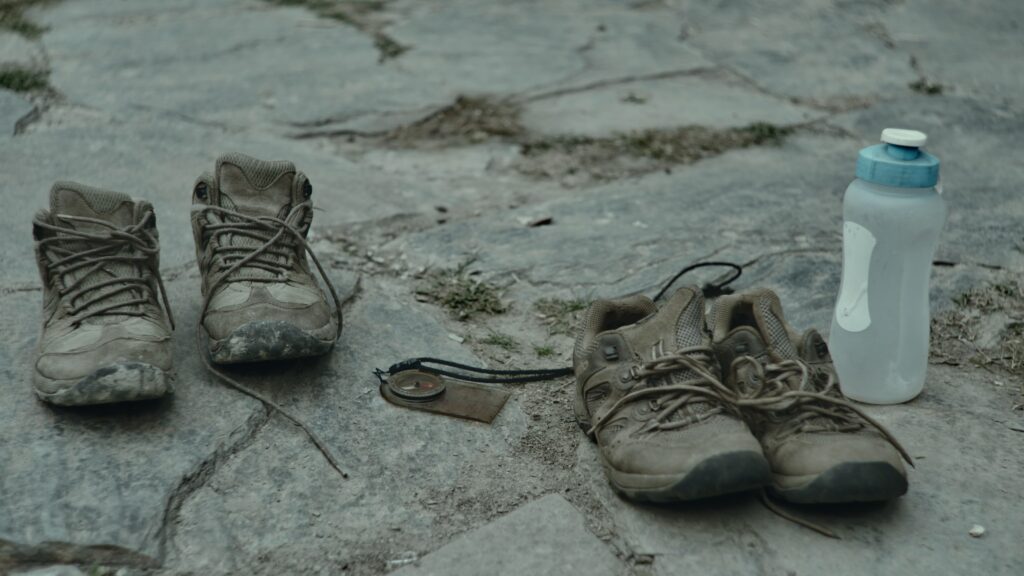Dreams of traveling
We first encounter Taiwanese filmmaker Yi-shan Lo years after her best friend Chun died on a shallow cave ledge in the Nepalese mountains. Chun and Yueh, a young couple who loved hiking and exploring (and filming) together, ran into serious trouble in the midst of a carefully planned trek. In her stunning directorial feature début, Yi-shan returns to the scene to honor Chun, who died just three days before rescue teams reached him and Yueh. Chun and Yi-shan – who also shared dreams of traveling abroad together someday in the future – had made a promise to one another that whoever survived would tell the story of the 47-day ordeal. The result is a film at once beautiful and searingly painful, an ode to profound loss, to a life and all of its possibilities brutally cut short.
“Witnessing Chun’s silent tears, I admired his courage and resilience. Alongside his beloved Yueh, they inspired me to explore the world beyond the classroom, and we made a promise to travel together someday.”
After the Snowmelt contains, at its heart, a deep and abiding story of devotional friendship. Yi-shan and Chun first met at an all-girl Catholic high school, where Chun’s emerging transgender identity drew criticism. Yi-shan has said that “Witnessing Chun’s silent tears, I admired his courage and resilience. Alongside his beloved Yueh, they inspired me to explore the world beyond the classroom, and we made a promise to travel together someday.” Her desire to honor that promise drives Yi-shan to assume the role of survivor – and storyteller. She allows us to witness her own emotional struggles as she endeavors to fully embrace the responsibilities of sharing the story of Chun’s life and death with the world.

Taking her time – with her pen, her eye, her camera lens, her complicated emotions – Yi-shan uses the expansive elasticity of cinematic time and space to move bravely into the realm of mourning someone she fully expected to be her friend, traveling companion, and soul mate, for the rest of their lives. Chun’s boyfriend, Yueh, is also a survivor, but of a different stripe. Yueh offers up a mysterious and multifaceted presence, struggling mightily to guard his own sense of loss and disorientation. But being the survivor of his and Chun’s journey weighs on him very heavily. Yueh and Yi-Shan, with the ghost of Chun between them, negotiate their own complex relationship, and in these encounters, once again, Yi-shan takes much time and space to explore what’s at stake for both of them – not only in making this film but in the choices they each make: moving closer in Yi-shan’s case, retreating in Yueh’s. It is a delicate, fragile dance. And as much as Yi-shan tries to convince Yueh to accompany her to the mountain shelf where Chun died, Yi-shan must ultimately go on this pilgrimage alone.
The great barrier/connection between Yueh and Yi-Shan over someone they both loved so much is deeply moving, particularly because they are grieving in such different ways. The gulf between them turns into a bit of a power play between Yi-shan’s yearning and searching camera and Yueh’s guardedness in refusing to share his own memories of the last moments of Chun’s life. He finds the camera intrusive, but also knows that Yi-Shan and Chun shared the language of moving image to capture things in an attempt to better understand the world around them and their place in it. In order to move forward, Yueh simply cannot go back.
The second half of the film sees something extraordinary blossom that is both filmically and narratively divergent from its first half as Yi-shan prepares herself to go it alone, continuing to explore her own sadness and grief. The various aspects of self-shooting against the interior landscape of her fears, feel as if each moment weighs as heavily on her as her commitment to take the journey to Nepal. The result is a potent homage, startling and wide-ranging, enchanting and incredibly tender. With an uncanny sophistication, Yi-shan’s film becomes a meditation of the magnificent natural beauty she encounters in the Nepalese mountains, contemplative and poetic in its silences. In the lingering frames of what’s left of Chun – a pair of his worn-out shoes, a water bottle, a compass, and diary – the ephemerality of our existences hits home, illustrating the inconsequentiality of one human life against majestic nature, cruel in its indifference to our small triumphs and tragedies. Yi-Shan can only stand in awe of the grandeur of mountains and forests and waterfalls.

There is so much assurance and potential in an emerging storyteller willing to risk so much restraint. Yi-shan’s ultimate failure to do anything but create a small shrine to Chun is breathtaking, and far surpasses the story’s premise of merely fulfilling a pact amongst friends. In creating a rich inner world of her own grief, enhanced by her exquisite cinematic eye, Yi-shan gifts us with a world in which to ponder our own experiences of grief that are just as unending and inexplicable as her own.
Pamela Cohn is a Helsinki-based critic, writer, film & video curator, story structure consultant, and festival moderator. She’s the author of Lucid Dreaming: Conversations with 29 Filmmakers(OR Books, New York & London, 2020), and co-producer and host of The Lucid Dreaming Podcast: Conversations on Cinema, Art & Moving Image. http://www.pamelacohn.com/